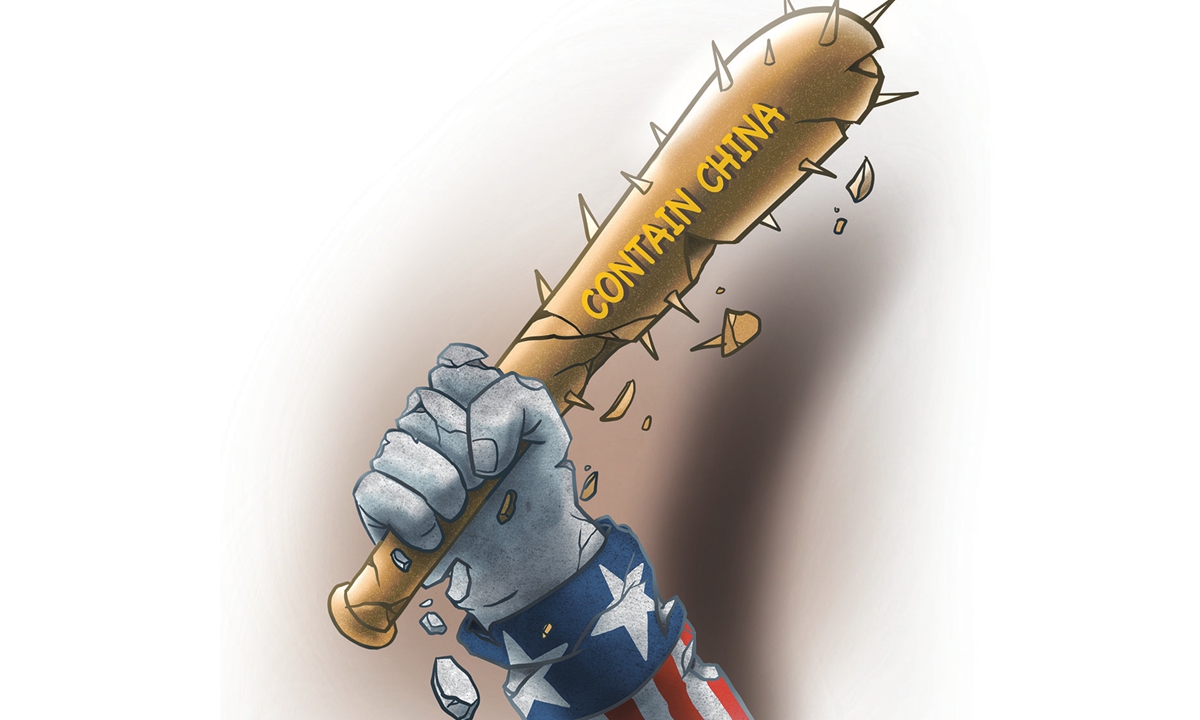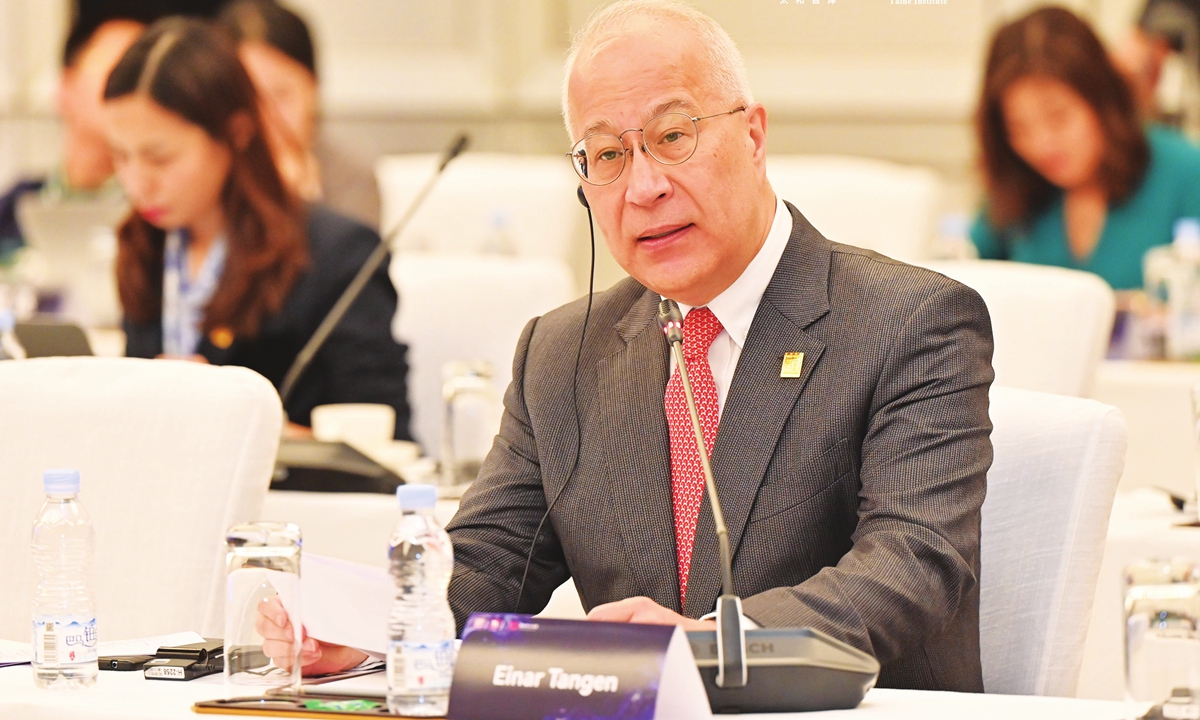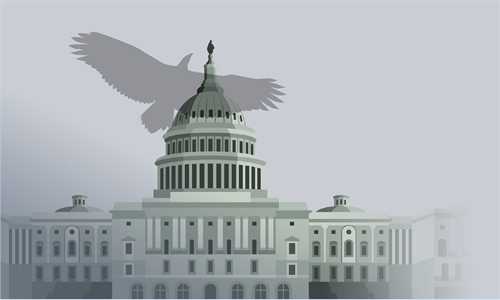
Illustration: Liu Rui/Global Times
Editor's Note:
Is China-US relationship locked in an increasingly intense rivalry or is there possibly a "window of opportunity" to mend strained ties between the two countries? A number of recent visits to China by high-ranking US officials were made, including Secretary of State Antony Blinken, Treasury Secretary Janet Yellen, Climate Envoy John Kerry, and Commerce Secretary Gina Raimondo. Veteran US diplomat Henry Kissinger also visited China in July. Where is the China-US relationship headed as high-level interactions increase? Einar Tangen (Tangen), a senior fellow of the Beijing-based think tank Taihe Institute, founder and chairman of China Cities Bluebook Consulting and former chairman of the State of Wisconsin's International Trade Council, shared his insights with Global Times (GT) reporter Li Aixin, during the 7th Taihe Civilizations Forum held on Tuesday.
GT: How would you comment on the recent series of visits by US officials and veteran US diplomat? What message did they convey?
Tangen: You have to separate Henry Kissinger from the other four. The administration people simply came to "gaslight" China.
Kissinger was at the signing of the Three Communiqués – he is a living reminder that the US agreed to one-China policy. His hope, like the hope of all rational people, is that an armed conflict can be avoided.
The other four were part of, in essence, a "gaslighting" operation. Publicly declaring a desire to engage with China while engaging in hostile acts – military provocations in the Taiwan Straits, the South China Seas, anti-China congressional and the administration acts and statements…
But, you can't expect someone to want to talk with you, if you keep slapping them.
GT: Will these visits make any difference to the US' China policy?
Tangen: No. The major issue is the Biden administration's lack of a China, or for that matter an international, strategy. Containing China is not a strategy and it isn't working. China continues to forge ahead, for example, pioneering new methods that can replace silicon with gallium, which would revolutionize chip design, capabilities, and fabrication. Another example is the Huawei Mate 60 phone, which is using a 7 nanometer chip which allows it to equal Apple's iPhone.
If the intent was to contain China, US policy is actually working in reverse. We live in an interconnected global supply chain, where progress and prices come from research, competition, and efficiency. China has for the last eight years led the world in the installation of industrial robots, is leading the world in making its industries cost competitive, as domestic wages rates rise, by instituting Industry 4.0 systems.
In such a world the US, instead of competing, seems intent on spreading uncertainty, strife, and Inflation, in an awkward attempt to maintain its hegemony, in a world that is already multipolar.
GT: Will Huawei's case impact the US policy of decoupling with and suppressing China?
Tangen: I doubt it. Washington is gripped by a national hysteria, similar to what it experienced under former senator Joe McCarthy. If anyone says anything good or neutral about China, talks about rational policy or realities, they are labeled "panda huggers" who can't be trusted.
Today, being Asian subjects you automatically to suspicion and increases your chances of being racially profiled, as well as verbally and physically attacked. Every Asian in government and academia is being viewed as a potential spy. Asian students aren't allowed to enroll in hard science courses. All of this under the pretext of national security. Where there have been trials, the government has lost the overwhelming number of cases, as with the numerous cases where academics have been accused of spying. The result, a growing outflow of Chinese scientists and executives, leaving the US, as Asian students look elsewhere for advanced education.
The US is a nation racked by poverty, homelessness, crime, gun violence, political polarity, and racism. For those seeking the American Dream, the reality has become disappointing. In cases of Asian hate crimes, which increased 342 percent in 2021, according to a nationwide study by California State University in San Bernardino, Washington's standard response, decry the violence, but continue the anti-Asian rhetoric that fans it.
As Huawei has shown, investing in people, processes, and competition, is more effective than efforts to decouple/de-risk/suppress.

Einar Tangen Photo: Courtesy of Taihe Institute
GT: Some observers tend to think the period
from now until November is a "window of opportunity" for the recovery
of China-US relations. What's your take on this?
Tangen: I can't see a window, domestic politics is, as always, front and center for Biden. He is focused almost exclusively on next year's election. Staying in power is the objective, governing is a sideline.
Since taking office as president, he has not been able to unify the country, or even follow through on his campaign issues. He criticized Donald Trump for his unilateral imposed tariffs, but has kept many of them in place, despite saying they were hurting the American people more than Chinese businesses.
He hasn't created a workable policy toward China. He hasn't been able to articulate a global vision, unless repeating Donald Trump's America First is a global vision. The world is not safer today than it was when Trump left office.
His idea of global diplomacy, is using India's chairing of the G20 to water down any criticisms against the US for: broken climate change funding promises, undermining the WTO, inaction on global health, poverty, debt and development issues. India got agreements on outstanding WTO cases the US had brought, an India-US joint venture military jet engine factory, and support for an India-Europe transportation corridor, which the US Congress would never fund, while the US turned a blind eye on Kashmir, corruption, the caste system, and human rights.
For example, instead of a strong statement on the trail of broken developed country promises to deliver 100 billion a year for developing world climate mitigation, there was a statement that there would be an effort to triple the amount of renewable energy. Ironically, a policy, if followed through, would favor China, since China is the dominant force in those industries.
The announcement of the new transportation corridor (the India-Middle East-Europe Economic Corridor) as a competitor to the Belt and Road Initiative is laughable.
The BRI has been around for 10 years, it has demonstrated its resolve with a trillion dollar's worth of investments in projects that according to The Chartered Institute of Building, the BRI will boost world GDP by over $7 trillion per annum by 2040.
The Biden Administration's idea, developed last October, after criticizing the BRI as a waste of resources aimed at "debt-trap diplomacy," was to connect Europe to India, as a competitor to China’s BRI.
Question is, in an increasingly isolationist Congress, how would Biden be able to get funding for a project that has nothing to do with Making America Great.
It is true, as the presidential election gets closer, Biden would like to have some sort of temporary economic rapprochement with China if it could improve the domestic economic situation. The obvious choice would be to remove Trump's economic tariffs, but he is afraid of being labeled "soft on China", so it is doubtful he will pull the trigger.
The main difficulty is there is no coherent China engagement policy, just an emotional desire to contain it. As we all know, it's hard to adjust feelings.
GT: After G20, Biden paid a short visit to Vietnam, where he said US outreach to Vietnam is not about containing China. Did he mean it?
Tangen: It's difficult to know what Biden means when he talks. He constantly says he's not trying to contain China, that he adheres to the Three Communiques, and the “one-China” policy, but he has said four times that he would support Taiwan island militarily if force was used to unite the breakaway province.
Actually, Biden says many things the White House says he doesn't mean. Quite frankly, in the US, as well as internationally, there are concerns about what he means, as the White House seems to continually reinterpret whatever he says.
The irony with Vietnam is the US waged a brutal war that resulted in millions of civilian and military deaths, millions of tons of bombs, massive areas deforested by Agent Orange, and unexploded ordnance, like cluster bombs, which continue to kill and maim civilians to this day.
Vietnam is run by the Communist Party that drove the US out of their lands. Biden's pitch is we don't like Communist China, we want to ally with Vietnam, a Communist country, against your neighboring Communist country, because they don't share our values.
It doesn't make any sense, but the Vietnamese, for their part, are happy to take whatever they can get and thumb their noses at the US as they continue negotiating arms deals with Russia.
On a larger level, this has become a prevalent pattern. India was able to obtain concessions from the US, while not joining in on trade sanctions and outright condemnation of Russia over Ukraine, in fact India is now the largest importer of Russian oil, which ironically, they buy cheap and then sell to Europe. India continues to use the Russian S-400 missile system, as well as numerous armaments and other weapons systems, while also getting US jet engines and weapons systems.
South Africa has been more than willing to vocalize its amused contempt for Washington's attempts at coercion. Saudi Arabia has followed its own economic interests, when it comes to oil supplies and pricing. But, both countries continue to maintain cordial diplomatic relationships with Washington.
GT: Do you think there is still a cure or a key to resolving the strained China-US ties?
Tangen: The key is for Washington to recognize that the days of its hegemony have gone, replaced by a multipolar world, but that is something that the current Washington elites are incapable of doing. Therefore, change will have to come from the American public, the voters.
Why would the American public want change, because about five decades ago the middle class accounted for 62 percent of the US population, today, it is only 50 percent. Inflation is decreasing real wages month by month, consumer debt is higher than it has ever been, loan defaults are skyrocketing, about 60 percent of consumers live paycheck to paycheck, and 40 percent don't have $400 in case of an emergency, small business are reigning in their investments. Meanwhile, the Fed continues to raise interest rates, oblivious to the fact that the inflation is coming from service side wage increases, which continue to increase.
It will be up to the American people to reverse the course, because the elites in Washington have it firmly in their mind that China is the enemy, and that every problem in the US is China's fault, even if, like the ever growing deficit, it is a domestic issue of poor governance.
In the end, governments are measured in terms of how they take care of their people. The first role of government is to provide a safe, orderly environment. In this the US failed. It is now commonplace for those in government to say, "Buy a gun, because we can't protect you, you have to protect yourselves." You see the shootings in schools and workplaces, on the streets, in shopping malls and people's homes. You see videos of shoplifters brazenly robbing stores, drug addicts, beggars, mentally ill, and homeless, living on the streets. Crime has become an epidemic.
The second duty of government is to provide opportunity. Education, a social safety net and policies that encourage entrepreneurship and innovation, fair legal systems, a government that can regulate, without smothering, these are elements of what is needed to create opportunities. Right now though, the US isn't providing what is needed, (but is providing) too big to fail industry oligarchs, a massive and growing national debt, under-funded education, cuts to social welfare, overly expensive healthcare, social and political divisions, international policies that are closing rather than opening markets, and are making investment abroad more uncertain.
Examples of unsustainable and lost opportunities: TSMC has said a chip made in Taiwan will be 30 percent less expensive than the same chip made in an American factory. Actions to prevent the sale of computer chips and chip making equipment are closing the Chinese market, which is one third of the world market, to US companies. Bans on US investments in Chinese companies means they won't be able to participate in China's innovation and general economic rise.
So, while the US cites capitalism, open markets and competition, Washington doesn't accept the realities of what this means, if it doesn't benefit the US.
Washington's real problems are domestic, they are tied to its development and governance models, China is just a convenient scapegoat for issues the US refuses to address.

